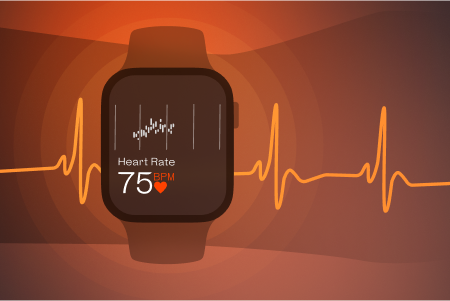
Measuring Resting Heart Rate
From manual pulse counts to the latest in app technology, dive into the transformative journey of heart rate monitoring
Home » Stress & Energy » 8 Ways to Cope With Stress
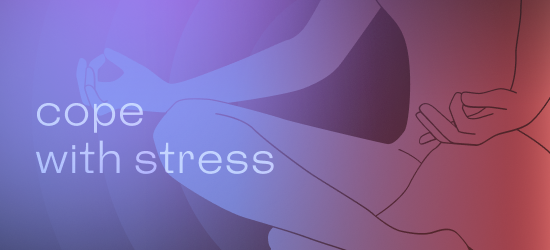
Between hectic schedules and world events, it can be challenging not to feel stressed. And to some extent, it is a normal part of life. But excessive stress can adversely affect your health and well-being in various ways, which is why learning to manage it is essential.
Some degree of stress can be beneficial, motivating you to change a crummy situation or achieve an important goal. It can even be crucial for survival. By activating the body’s fight or flight response, stress helped early humans escape lions, landslides, and other perils. And while you’re more likely to encounter it when facing a pressing deadline, rather than a hangry tiger, stress can serve a similar purpose today.
Although stress can be a motivator, if not a lifesaver, too much can stop you in your tracks, preventing you from performing your best or even functioning at all. Chronic stress can also wreak havoc on your body and brain, affecting your mood, draining your energy, and increasing your susceptibility to various conditions, from heart disease to depression. That’s why learning to identify and cope with stress is essential to maintain optimal physical and mental health.
You might not always realize you’re stressed, particularly if you’re used to living with it. Nonetheless, stress’ physiological side effects make it easy to identify. The mechanism is the same regardless of what initiated your “fight or flight” mode. The automatic nervous system (ANS) releases an onslaught of hormones, including adrenaline and cortisol, while directing resources toward the muscles and vital organs, causing increased breath and heart rate and decreased heart rate variability (HRV), among other changes
An ounce of prevention is worth a pound of cure when it comes to managing stress. Identifying your stressors and taking steps to mitigate them is essential. But there are also several ways to reduce your susceptibility and deal with stress as it comes.
While you are asleep, your brain and body recuperate and recharge, preparing you for the coming day. If you don’t have enough shuteye, you could be more vulnerable to multiple health issues, including increased stress, anxiety, and illness. Even a slight sleep deficit can affect your mental and physical capacity, which is why prioritizing rest is essential for stress management.
Of course, stress can also impair sleep, creating a vicious cycle. If you struggle with insomnia, there are several tactics to try, including supplements like melatonin, deep breathing exercises, avoiding alcohol or heavy meals before bed, and practicing good sleep hygiene.
You’re not alone if you tend to reach for a bag of crisps or a box of cookies after a rough day. “Stress eating” is common. The International Food Information Council’s (IFIC) 2022 Food & Health Survey of 1,005 US adults found people who reported being very stressed in the last six months were more likely to snack three times a day than those who had felt only somewhat stressed. And a 2013 report by the American Psychological Association found that 38% of adults had overeaten or eaten unhealthy foods in the past month because of stress.
What you eat and drink can exacerbate or help to alleviate stress. Alcohol, for example, can momentarily relieve stress and anxiety. But drinking too much over time can alter the brain’s chemical makeup and wreak havoc on a person’s mental health. Caffeine and nicotine can also increase stress levels, as can the same ultra-processed foods you might crave in tough times.
On the other hand, eating whole foods, like plants, whole grains, and fermented foods, may help reduce and prevent stress while improving overall well-being. In part, that’s because these foods benefit the gut microbiota, which research shows have a significant impact on mental health and general wellness.
Deep breathing, also known as diaphragmatic or belly breathing, is a relaxation technique that counteracts the body’s “fight or flight” response to restore calm. There are several ways to do it, but the basic premise is to inhale deeply from the belly to fill the lungs before slowly exhaling. Doing so sends more oxygen to the brain and stimulates the parasympathetic nervous system, producing a relaxing effect.
Deep breathing is often an important component of mindfulness and meditation practices. You can also use it as a grounding technique to manage stress and anxiety in the moment. Focusing on your breath can help you reconnect with your body and the present while diverting your attention from the worries in your head. Try listening to Welltory’s Breathing in the Universe playlist to enhance relaxation.
Get Welltory
for stress relief
Get Welltory
for stress relief
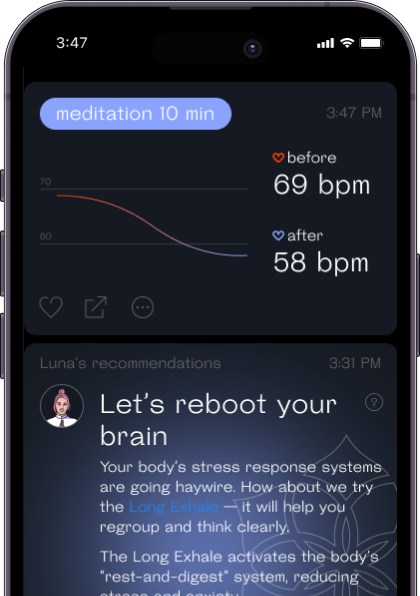
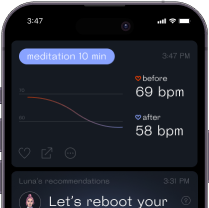

The physical and psychological health benefits of exercise are well-documented. In addition to strengthening bones and muscles and conditioning vital organs like the heart and lungs, exercise reduces cortisol levels and stimulates the release of serotonin, dopamine, norepinephrine, and endocannabinoids — all of which are crucial for emotional and neurological well-being. It also increases levels of brain-derived neurotrophic factor (BDNF) and gamma-aminobutyric acid (GABA), a neurotransmitter known for its relaxing effect, and can help you deal with stress.
Moving your body for just 20 minutes can instantly ease stress and improve your mood, but consistent workouts, over time, can produce more profound benefits. The CDC recommends most people aim for at least 150 minutes of moderate activity — that which gets your heart rate up to between 64% and 76% of your maximum — each week. Try making fitness part of your daily and weekly routine and find activities you enjoy.
Deep breathing is often an important component of mindfulness and meditation practices. You can also use it as a grounding technique to manage stress and anxiety in the moment. Focusing on your breath can help you reconnect with your body and the present while diverting your attention from the worries in your head. Try listening to Welltory’s Breathing in the Universe playlist to enhance relaxation.
Although it’s only recently become mainstream, meditation is an ancient practice that people of different religions and cultures have utilized for thousands of years. Research shows that meditation can produce several health benefits, including reducing stress and improving cognitive and emotional well-being. Mindfulness-based practices, in particular, are proven to be highly effective, and the benefits are even more significant if the meditator is near water or otherwise in nature.
Hobbies are more than a pastime; they could be integral to good health and effective stress management. Whether drawing, reading, fishing, cooking, or stamp-collecting, spending time doing activities you enjoy can enhance your well-being and quality of life. Research shows people who have hobbies are less likely to experience stress, low mood, or depression. Engaging in pleasurable, meaningful activities may even help you live longer. And if your hobby involves exercise, creativity, learning, giving back, or working or playing with others – all the better, as these types of pursuits can further bolster mental health and general wellness.
A structured, consistent routine can help you pre-empt and deal with stress more effectively. Consider using a Google calendar or other planner to plan your day and week. If you have too much on your plate, cut out unnecessary tasks or postpone those that aren’t time sensitive. When creating your schedule, carve out time for exercise, hobbies, and spending time with loved ones, even during busy periods.
Sticking to a routine with set times for eating, sleeping, and exercise and clear delineations between work and personal life can help you avoid becoming overwhelmed or burnt out while supporting healthy circadian rhythms – biological clocks that manage various mental and physical functions on a 24-hour cycle.
Besides affection and companionship, pets can also provide health benefits. Research shows interacting with animals decreases cortisol levels and blood pressure, and spending extended periods with four-legged friends can improve overall health. Doctors frequently prescribe companion animals for people with chronic conditions, such as anxiety, post-traumatic stress, and depression. Pets can also help with everyday stress management.
As previously mentioned, stress produces multiple physiological responses, including changing your HRV and breath rate. These markers make it easy to calculate your stress level.
By tracking health metrics with Welltory and a wearable device, you can measure your stress day-to-day and week-to-week and find correlations between stress and specific behaviors and circumstances. For instance, you can see how a good workout, quality sleep, or a late night out affect your stress levels the next day.
Plus, as you try different stress management techniques, like meditation or breathing exercises, Welltory can help you see the positive effects these new habits have in the short- and long-term. And if a new habit isn’t working as well as you’d hoped, Welltory can help you recognize that, too, so you can try something different.
Even a brief bout of stress can affect your well-being, but long-term stress can have profound lasting implications. Tracking metrics like your HRV and reading Welltory’s personalized insights can help you measure stress levels and identify what’s helping or hindering your health. As you try the methods listed above to cope with stress, keep in mind that it might take some time and trial and error to determine what works best for you.
Welltory Team, 22 Dec. 2022

From manual pulse counts to the latest in app technology, dive into the transformative journey of heart rate monitoring

Discover the intricate relationship between late-night eating and its impact on sleep duration and quality
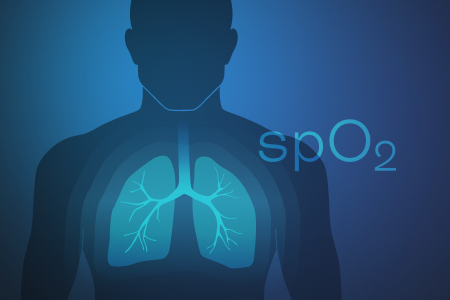
From boosting cognitive function to enhancing physical performance, discover the impact of blood oxygen levels on various aspects of health

The relationship between stress and productivity and how Welltory can help you plan better
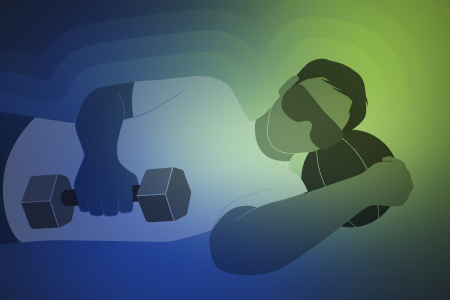
Does sleeping burn any calories, should you exercise right before bed and how much do you need to sleep to burn a 1000 Cal
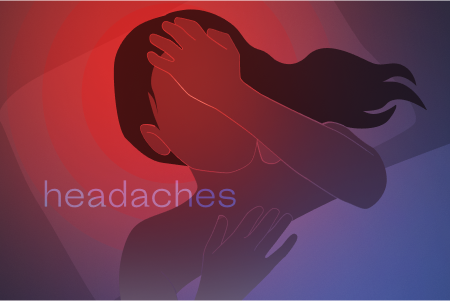
All you needed to know about headaches at night – types of nighttime headaches, their causes, possible treatment and how to avoid them.
 App Store
App Store
 Google Play
Google Play
 Huawei AppGallery
Huawei AppGallery
 Galaxy Store
Galaxy Store







